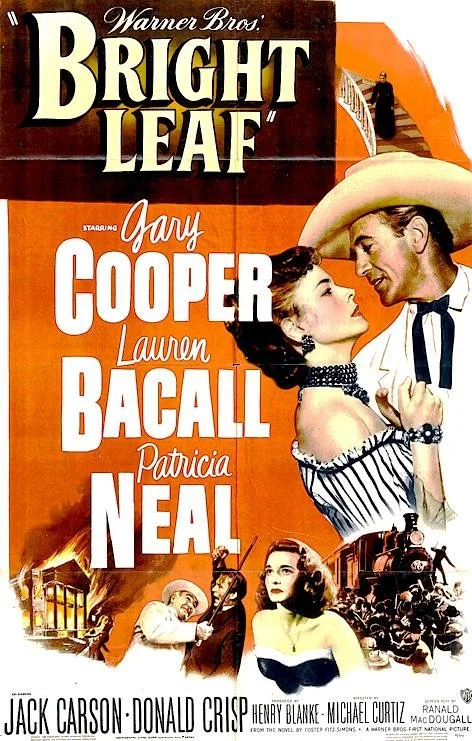Bright Leaf
Directed by Michael Curtiz 110 mins (1950)
Gary Cooper – Brant Royle
In 1894, Royle returns to a southern town which he and his father had been forced to leave by Singleton, the biggest and richest tobacco-grower in the area. Royle, among other plans, intends to marry Singleton's daughter, Margaret, and gain possession of Singleton's fabulous mansion, "Bright Leaf." He gets the need financial support to compete against Singleton from an old flame, Sonia, and he eventually does so, and drives Singleton to suicide. To complete his business affairs, he marries Margaret. But Margaret also has a plan or two, none of which bode well for her new husband.
Also starring Lauren Bacall, Patricia Neal, Jack Carson, Donald Crisp and Gladys George.
This was the last film in Lauren Bacall’s seven-year contract with Warner Brothers.To add accuracy to the film, an authentic, turn-of-the- century cigarette maker was purchased as a prop.
MARIA’S NOTES
TOBACCO. Be it smoking or chewing it, what a driving force in so many cultures worldwide.
The term “bright leaf” is a description of a certain type of flue-cured, heat-dried tobacco which turns a brilliant yellow. This type became very popular in North Carolina in the early 1840’s. My father’s film Bright Leaf tells the somewhat dramatized story of the great business rivalries in developing America between two Tobacco tycoons in the late 19th century. There were big fortunes to be made, especially with the invention of a cigarette-making machine that took that task away from the previous group of workers––women and children.
The actual men involved were John Harvey McElwee, portrayed by my father in the film as Brant Royal, and James Buchanan Duke, of Duke University. Through the tobacco industry, the Duke family became known as the Southern Rockefellers!
By comparison, John McElwee did not fare so well. As the movie unfolds, we see the tragedy of competition and ambition destroying a man who was trying to make it to the top of the heap. The movie is very dramatic, with strong dynamic tensions between Brant Royal and the two female leads, portrayed by Patricia Neal and Lauren Bacall.
McElwee’s great grandson, Ross McElwee, made an interesting documentary in 2003 about the family drama and history. The film, Bright Leaves, explores the legacy of the tobacco empire in North Carolina and investigates whether Bright Leaf was inspired by the real-life feud between his great-grandfather and the Duke family. Through interviews, family stories, and personal reflection, McElwee pieces together a complex portrait of Southern identity and the complexities of family businesses.
An ironic footnote: As I write about this film, I can’t help but acknowledge that my father died of cancer—the primary site being in his lungs. He smoked like a chimney and tried many times to stop––unsuccessfully! Our close family friend Dr. Alton Ochsner, head of the Ochsner Clinic in New Orleans, showed my father his research laboratory riddles with dozens of cancer-damaged lungs. He came back home saying “Never, never again am I having another cigarette!”
First day back on the set – stress. Out came the Chesterfields or Parliaments. He died from cancer one week after his 60th birthday.
Bright Leaf may be a dramatization, but it offers a powerful glimpse into the roots of American industry and the real cost of ambition. It’s a film worth revisiting—not just for the performances, but for what it reveals about how a single crop shaped a nation’s economy, culture, and conscience.

